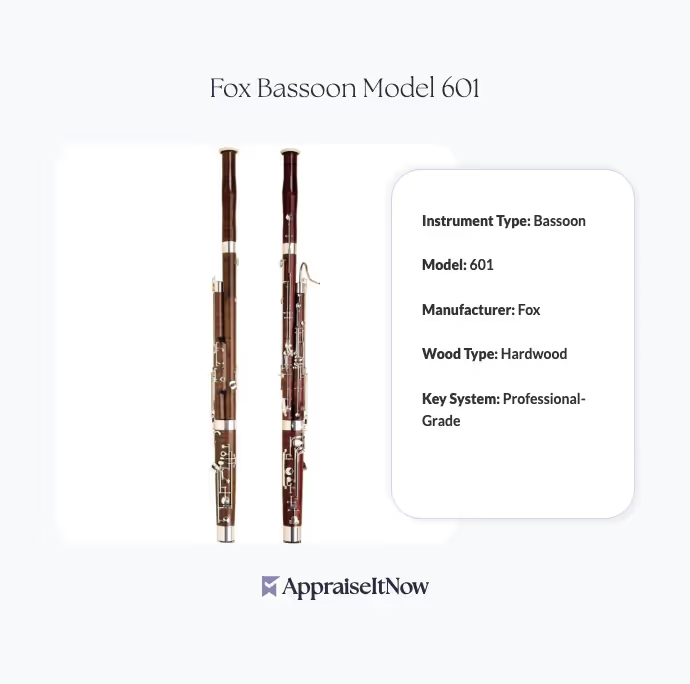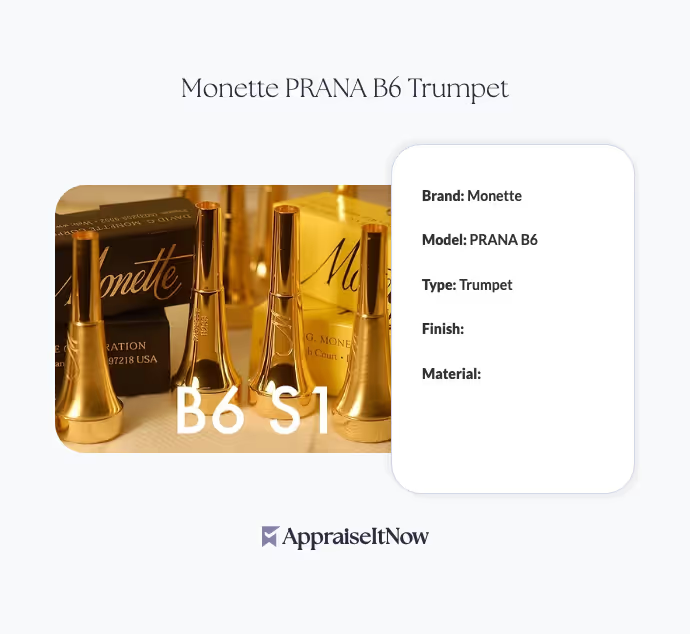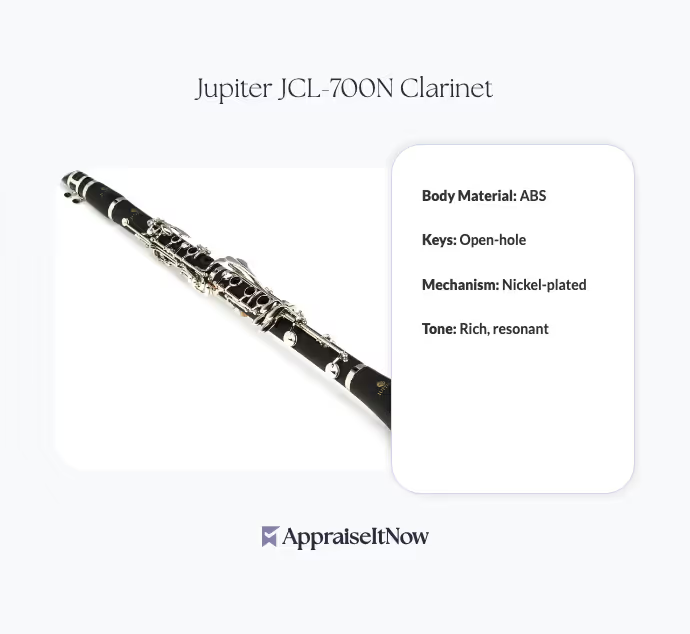<h1>How to Get Your Fox Bassoon Model 601 Appraised</h1>
<p>The Fox Bassoon Model 601 stands as one of the most respected professional-grade woodwind instruments in the classical music world. Whether you're preparing to sell, seeking insurance coverage, or simply want to understand what your instrument is worth, knowing how to navigate the appraisal process ensures you receive an accurate valuation backed by expert credentials and market data.</p>
<h2>Understanding Fox Bassoon Model 601 Market Value</h2>
<p>Your Fox Bassoon Model 601 commands significant value in today's market, typically ranging between <strong>$10,000 and $15,000</strong> depending on condition, age, and provenance. This valuation reflects the instrument's reputation among professional musicians and orchestras who prize its exceptional craftsmanship and distinctive key system. Since its introduction in 1960, only around 500 units have been produced worldwide, creating genuine scarcity that underpins its collector and professional market value.</p>
<p>The instrument's appeal stems from multiple factors working in concert. Crafted from select hardwoods using precision manufacturing techniques, each Fox Bassoon Model 601 delivers the impeccable intonation and balanced tonal qualities that professionals demand. This consistency in quality, combined with its responsive playability and distinctive key design, has made it a favorite among symphony orchestras and accomplished musicians across decades.</p>
<div class="callout tip"><p><strong>Market Context</strong></p>
<p>Professional-grade bassoons typically hold value better than student models, and Fox instruments consistently outperform the broader woodwind market for both resale and rental value.</p></div>
<h2>What Condition Indicators Really Mean for Your Appraisal</h2>
<p>When you bring your Fox Bassoon Model 601 to an appraiser, they'll examine several critical condition markers that directly impact valuation. Understanding these indicators helps you grasp why your appraisal might differ from another 601 model or prepare your instrument accordingly before evaluation.</p>
<p>The pads represent perhaps the most significant wear component on any bassoon. Original or recently replaced pads affect value substantially—aged, hardened pads that leak air can reduce value by 20-30%, while recently repadded instruments often command premium pricing. Keywork integrity matters equally; any bent keys, missing springs, or sluggish key action signals wear that appraisers factor into their assessments. The bore condition reveals your instrument's playing history; bright, well-maintained bores indicate proper care and light use, while darkened or pitted bores suggest either aggressive playing conditions or inadequate storage humidity.</p>
<p>Small mechanical details compound this assessment. Rust spots on metal components, water damage staining, crack repairs (even professional ones), and finish wear all contribute to the overall condition grade your appraiser assigns. Professional <a href="/blog/appraising-musical-instruments-determining-the-worth-of-melodic-investments">musical instrument appraisals</a> evaluate these factors using standardized grading systems that appraisers trained by organizations like the <strong>American Society of Appraisers (ASA)</strong> and <strong>International Society of Appraisers (ISA)</strong> have developed.</p>
<h2>How Serial Numbers, Production Years, and Age Influence Value</h2>
<p>Your Fox Bassoon Model 601's serial number tells a detailed story about its manufacturing timeline and, by extension, its market value. The model was first introduced in 1960, and Fox maintained consistent production for decades. Instruments from the 1960s and early 1970s—the "golden era" of Fox production—often command 15-25% premiums compared to 1980s or 1990s examples, assuming equal condition.</p>
<p>Serial numbers allow appraisers to verify authenticity and estimate production year within a range. Early production instruments often feature slightly different specifications or construction details that collectors value differently. Knowing your instrument's exact production year helps contextualize its features and expected wear patterns. A 1965 Model 601 showing moderate pad wear might actually be valued higher than a 1985 example in pristine condition, because the vintage carries historical significance and the rarity of finding well-maintained examples from that production run commands market premium.</p>
<p>Age alone doesn't automatically reduce bassoon value the way it might depreciate an automobile. Instead, the relationship between age, condition, and manufacturing authenticity creates the valuation equation. A meticulously maintained 60-year-old instrument often outpaces a neglected 20-year-old example by thousands of dollars.</p>
<h2>Documentation and Provenance That Matter Most</h2>
<p>When preparing for your appraisal, compile whatever documentation you can locate. Purchase receipts, even decades old, provide compelling evidence of authenticity and establish a baseline value trajectory. Original cases—particularly Fox's branded hard cases—add measurable value because they indicate an owner who invested in proper storage and care.</p>
<p>Maintenance records transform a routine appraisal into a compelling valuation narrative. If you can document professional repadding, keywork adjustments, or bore work performed by respected repair technicians, your appraiser has concrete evidence of the instrument's care history. This documentation becomes especially valuable when explaining why your Fox 601 commands premium pricing despite age. School or orchestra ownership records add historical context that certain collectors actively seek.</p>
<p>Conversely, the absence of documentation doesn't necessarily devalue an instrument—many inherited or older acquisitions lack paper trails. However, clear provenance makes the appraiser's job easier and the resulting valuation more defensible for insurance purposes or in legal proceedings.</p>
<div class="callout note"><p><strong>Documentation Tip</strong></p>
<p>Even informal records help; a handwritten note describing when you purchased the instrument, from whom, and any major repairs undertaken strengthens your appraisal's supporting evidence.</p></div>
<h2>Rare Models, Custom Modifications, and Factory Work</h2>
<p>Not all Fox Bassoon Model 601 instruments are created equal, even within the model designation. Some examples feature factory modifications or represent transition years when Fox experimented with design variations. These differences can significantly impact value—both positively and negatively.</p>
<p>Custom modifications ordered at purchase, such as specific keywork enhancements or tonal adjustments, typically add value only if the modification was executed by Fox itself or a highly respected repair technician. Third-party modifications, even well-intentioned ones, can reduce value by making the instrument non-standard and potentially harder to sell later. Appraisers distinguish between factory work that enhances playability and amateur alterations that diminish authenticity.</p>
<p>Older factory repairs conducted by Fox during the instrument's manufacturing era represent a completely different category than modern restoration work. These vintage factory repairs often enhance value because they represent the manufacturer's own quality standards. Professional appraisers familiar with Fox's repair history can spot these distinctions and adjust valuations accordingly.</p>
<h2>Comparable Sales and Current Market Range</h2>
<p>Understanding recent market comparables grounds your appraisal expectations in reality. The Fox Bassoon Model 601 marketplace operates across multiple channels, each reflecting different buyer profiles and pricing dynamics. Private sales between musicians often occur below the <strong>$10,000-$15,000</strong> range, particularly when sellers want quick transactions. Dealer inventory typically sits within the published range, reflecting business overhead and warranty commitments. Auction results show interesting variance—prestigious auction houses specializing in musical instruments may achieve higher prices for exceptional examples with documented provenance, while general auction platforms sometimes see lower realizations.</p>
<p>Recent comparable transactions consistently show 1960s-era instruments commanding $12,000-$15,000 in very good condition, 1970s examples bringing $10,000-$13,000, and later production instruments settling toward the $8,000-$12,000 range. These prices assume professional condition assessment and proper documentation. Instruments requiring significant restoration work trade at substantial discounts, sometimes dropping to $6,000-$8,000 range.</p>
<p>Regional demand affects these figures; areas with active professional orchestras and strong music education programs see stronger demand and maintain higher prices. Metropolitan regions with conservatory programs and symphony orchestras tend to support premium pricing.</p>
<h2>Online Photo-Based Versus In-Person Inspection Accuracy</h2>
<p>The digital age has transformed appraisal accessibility. Many appraisers now offer preliminary valuations based on photographs, descriptions, and instrument specifications. This approach works particularly well for straightforward assessments where condition is clearly evident and the instrument doesn't show complicating factors. Photo-based appraisals provide a quick, cost-effective starting point and often fall within 10-15% of an eventual in-person assessment.</p>
<p>However, in-person inspections uncover details photography simply cannot capture. Playing condition that photographs can't reveal—how keys respond, whether pads seal properly, subtle bore condition details—require hands-on examination by trained specialists. For instruments at the higher end of the valuation range (approaching $15,000), or when you need market-defensible documentation for insurance, legal proceedings, or institutional purposes, in-person evaluation becomes essential.</p>
<p>Think of it similarly to how <a href="/blog/a-guide-to-professional-personal-property-appraisals">personal property appraisals</a> work across different scenarios—quick photo assessments serve preliminary purposes, while comprehensive in-person inspections provide the defensible documentation that stands up to insurance claims or legal challenges.</p>
<h2>Choosing the Right Appraiser Credentials</h2>
<p>Selecting an appraiser equipped to properly value your Fox Bassoon Model 601 requires understanding credential organizations and specialist qualifications. Look specifically for appraisers credentialed by major organizations like the <strong>American Society of Appraisers (ASA)</strong>, <strong>International Society of Appraisers (ISA)</strong>, or <strong>American Association of Appraisers (AAA)</strong>. These organizations maintain rigorous standards and require members to follow the Uniform Standards of Professional Appraisal Practice (USPAP).</p>
<p>Within these organizations, seek appraisers with specific credentials in musical instruments or collectible instruments. The designation "Accredited Member (AM)" or "Certified Appraiser (CAA)" from ASA indicates specialized training and experience. Some appraisers hold additional certifications from musical organizations or repair guilds, which demonstrates practical knowledge beyond theoretical valuation frameworks.</p>
<p>When contacting potential appraisers, ask specifically about their bassoon experience. Have they appraised Fox instruments before? Do they understand the technical differences between production years? Can they reference recent comparable sales? Professional <a href="/blog/appraisers-for-collectibles">appraisers for collectibles</a> who specialize in musical instruments maintain detailed market databases and personal relationships with dealers and musicians that inform their valuations.</p>
<h2>Insurance, Fair Market, and Auction Value Differences</h2>
<p>Here's something many people misunderstand about appraisals: the value your appraiser assigns varies depending on the intended use. Insurance replacement value typically tops out the range—appraisers assume you'll replace your instrument with a comparable new or recent model if loss occurs. Fair market value (what you'd receive selling to a willing buyer in a normal market) often sits at the midpoint of the range. Auction estimates, particularly for prestigious venues, might estimate slightly higher based on competitive bidding dynamics, though auction results don't always meet pre-sale estimates.</p>
<p>When requesting your appraisal, specify the intended purpose. For insurance, request a replacement value assessment. For sale preparation, request fair market value. This distinction significantly impacts the appraiser's methodology and the final number on your report. A certified appraiser will note their value type clearly and explain the assumptions underlying that specific valuation approach.</p>
<div class="callout tip"><p><strong>Appraisal Request Strategy</strong></p>
<p>Request multiple value conclusions if you're uncertain about future use; knowing replacement cost, fair market value, and potential auction estimate gives you comprehensive market intelligence.</p></div>
<h2>Turnaround Times and Fee Structures for Musical Instrument Appraisals</h2>
<p>Appraisal costs for a Fox Bassoon Model 601 typically range from $300-$600 for a comprehensive professional assessment, depending on whether it's photo-based ($250-$350) or requires in-person inspection ($400-$600). These fees reflect the appraiser's training, credentials, market research, and documentation time. Premium appraisers or those in high-cost metropolitan areas may charge toward the upper range.</p>
<p>Turnaround times vary considerably. Preliminary photo-based appraisals might arrive within 3-5 business days. Comprehensive in-person inspections often require 1-2 weeks from appointment to final report delivery, depending on the appraiser's schedule and report complexity. During peak seasons—often around year-end for insurance purposes or during active sale seasons—expect longer waits.</p>
<p>Higher-value instruments like your Fox Model 601 sometimes justify expedited service for an additional fee if you have time-sensitive needs. Reputable appraisers maintain these fee structures transparently, with written estimates before work begins.</p>
<h2>Authentication and Guarding Against Misattribution</h2>
<p>Authenticating your Fox Bassoon Model 601 protects both your valuation credibility and legal standing if you ever sell. Genuine Fox instruments carry specific manufacturing markers that trained appraisers recognize immediately. Serial numbers should correspond to Fox's known production records. Construction details, wood selection, and keywork design all follow Fox's documented specifications across different production periods.</p>
<p>Counterfeits of high-value instruments do exist, though bassoons represent a relatively small target compared to some other collectibles. More common than outright counterfeits are misattributions—instruments incorrectly identified as model 601 when they're actually earlier Heckel models or other makes with superficial similarity.</p>
<p>Professional appraisers use multiple verification methods: examining Fox's maker's marks, inspecting serial number locations and formatting, assessing construction techniques against period documentation, and sometimes consulting Fox archives when available. They document authentication findings thoroughly in their reports, creating defensible evidence of genuine provenance.</p>
<h2>Regional Demand and Market Dynamics</h2>
<p>Bassoon values fluctuate based on regional musical culture and player demographics. Metropolitan areas with active symphony orchestras, university music programs, and vibrant chamber music scenes support stronger demand and premium pricing. A Fox Bassoon Model 601 offered in New York or Los Angeles may command different prices than the identical instrument in areas with fewer professional orchestras.</p>
<p>Student versus professional market dynamics matter significantly. In regions with many music schools and growing student populations, instrument values remain steady due to rental and purchase demand from educators. In areas serving primarily professional musicians, vintage professional instruments like your 601 command stronger premiums from established players upgrading to better examples.</p>
<p>International markets occasionally shift pricing. Some European markets show stronger demand for vintage American-made or standard professional instruments, while certain international buyers actively seek specific production years or configurations. Understanding your local market context helps set realistic expectations for valuation.</p>
<h2>Preservation Recommendations Before Selling</h2>
<p>If you're considering selling your Fox Bassoon Model 601, certain maintenance approaches preserve value better than others. Avoid aggressive restoration that replaces original components unless absolutely necessary for function. Professional repadding by respected repair technicians maintains or enhances value. Similarly, addressing mechanical issues like sluggish keys or stuck springs through proper adjustment preserves the instrument without diminishing authenticity.</p>
<p>However, refinishing the exterior or replacing cosmetic components for appearance alone can actually reduce value among sophisticated collectors who value original patina and authentic aging. Consult with your appraiser before undertaking major work; they can advise on restoration approaches that enhance rather than diminish market value. This parallels how collectors approach <a href="/blog/understanding-the-value-of-your-antique-furniture-examining-quality-and-rarity">antique furniture and fine art</a>—preservation of original character often outweighs cosmetic modernization.</p>
<p>Ensure the instrument remains in climate-controlled storage, maintained within 45-55% relative humidity, which protects wood integrity and pad condition. Even modest storage improvements undertaken before appraisal can measurably boost valuation.</p>
<div class="callout note"><p><strong>Key Takeaway</strong></p>
<p>A professional appraisal of your Fox Bassoon Model 601 transforms ownership confidence and transaction clarity. Whether you're buying, selling, insuring, or simply documenting what you own, working with credentialed appraisers credentialed through <strong>ASA, ISA, or AAA</strong> ensures accurate valuation, market-defensible documentation, and the peace of mind that comes from expert assessment. Your $10,000-$15,000 instrument deserves nothing less than professional-grade evaluation backed by credentials, market research, and detailed supporting documentation.</p></div>
















